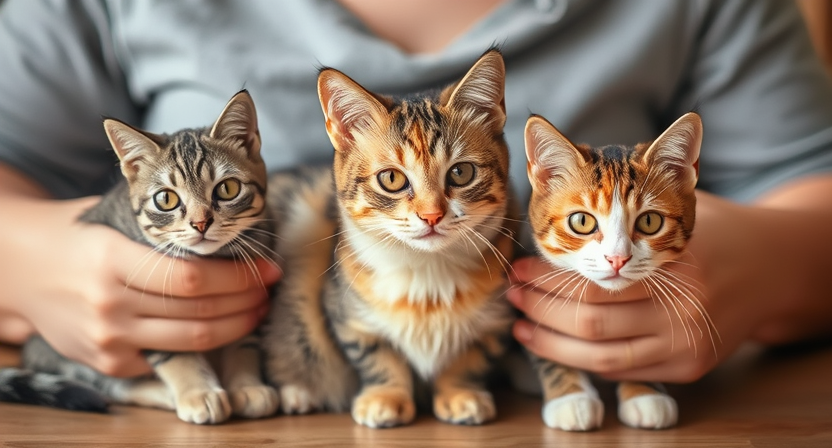
5 Health Benefits of Owning a Cat
Stress Reduction: How Cats Can Help Lower Stress Levels

Numerous studies have suggested that interaction with cats can help reduce stress levels. The gentle purring and comforting presence of these furry companions have a calming effect on humans. The act of stroking a cat has been found to release endorphins in the brain, which are known as “feel-good” hormones that promote relaxation. Moreover, the rhythmic sound of a cat’s purr has been found to have a soothing effect on the nervous system, helping to reduce anxiety and induce feelings of tranquility.
In addition to their physical presence, cats provide emotional support that can alleviate stress. The unconditional love and companionship offered by cats create a sense of security and comfort. Simply spending time with a cat can help combat feelings of loneliness and provide a distraction from daily worries. Their playful nature and ability to lighten the mood through antics can also be a welcome respite from the pressures of everyday life. All these factors contribute to the overall stress-reducing benefits that cats offer to their human counterparts.
Lower Blood Pressure: The Surprising Link Between Cats and Hypertension

Hypertension, or high blood pressure, is a common health condition that affects millions of people worldwide. While lifestyle changes and medication are often recommended for managing hypertension, a surprising link between cats and lower blood pressure has emerged. Research suggests that cat ownership may play a role in reducing blood pressure levels in individuals with hypertension.
One possible explanation for this phenomenon is the calming effect that cats can have on their owners. Interacting with cats, whether through petting, playing, or simply observing their behavior, has been shown to release oxytocin, a hormone known for its stress-reducing properties. This hormonal response can help to lower blood pressure and decrease symptoms of anxiety and tension. Additionally, the presence of a cat’s rhythmic purring has a soothing effect and can promote relaxation, which can have a positive impact on blood pressure levels. Although more studies are needed, the surprising link between cats and lower blood pressure raises intriguing possibilities for alternative methods of managing hypertension.
Improved Mental Health: The Positive Impact of Cat Ownership on Emotional Well-being

The positive impact of cat ownership on emotional well-being cannot be underestimated. Many studies have shown that having a cat as a companion can greatly improve mental health. Cats provide unconditional love and companionship, which can help alleviate feelings of loneliness and isolation.
Furthermore, the presence of a cat has been found to reduce stress levels and promote relaxation. Simply stroking a cat’s fur can release endorphins in the brain, leading to a sense of calm and tranquility. The rhythmic purring of a cat can also have a therapeutic effect, helping to lower anxiety and promote a sense of well-being. In addition, caring for a cat and having the responsibility of their well-being can provide a sense of purpose and fulfillment, contributing to overall emotional wellness.
Enhanced Immune System: How Cats Can Boost Your Body’s Defenses

Having a cat in your home not only brings joy and companionship but can also have a positive impact on your immune system. Research suggests that living with cats can boost your body’s defenses and improve your overall immune function. Cats are known to carry certain types of bacteria, such as Bartonella henselae, which is responsible for causing Cat Scratch Disease. While this might sound concerning, exposure to these bacteria actually has a beneficial effect on our immune system.
Studies have shown that having a cat around can strengthen our immune response, making us more resilient to infections and allergies. Regular contact with cats exposes us to a variety of antigens, which can stimulate our immune system and enhance its ability to fight off pathogens. This increased immune activity can lead to a reduced risk of developing allergies, asthma, and other respiratory conditions. So, by simply enjoying the company of your feline friend, you may be giving your immune system a natural boost.
Decreased Risk of Heart Disease: Exploring the Cardiovascular Benefits of Having a Cat

Having a cat as a pet has been linked to a decreased risk of heart disease. Several studies have shown that cat owners have lower rates of heart-related conditions compared to those who do not own cats. One reason for this is the soothing effect that cats have on their owners. Spending time with a cat, petting them, and listening to their purring can help reduce stress and anxiety levels, which in turn can have a positive impact on heart health. Stress is known to contribute to various cardiovascular problems, such as high blood pressure and heart attacks, and having a cat around can help alleviate these stressors.
Furthermore, cats can also encourage their owners to lead a physically active lifestyle, which is beneficial for heart health. Engaging in play sessions with a cat, such as using interactive toys or chasing a string, can provide opportunities for exercise and movement. Regular physical activity is essential for the maintenance of a healthy heart and can help reduce the risk of heart disease. Additionally, cats’ independent nature and their curiosity can motivate their owners to be more active, as they often need to engage in activities to keep up with their feline companions.
Allergy Prevention: How Growing Up with Cats Can Reduce Allergies in Children

Allergies are a common concern for parents, especially when it comes to their children. However, you may be surprised to learn that growing up with cats can actually help reduce allergies in children. Contrary to popular belief, exposure to cats at an early age can actually build up a child’s immune system and reduce the risk of developing allergies later in life.
Studies have shown that children who are exposed to cats during their first year of life are less likely to develop allergies to cats, as well as other common allergens such as dust mites and pollen. This early exposure helps to train the immune system to recognize and tolerate these allergens, rather than mounting a reaction against them. As a result, children who grow up with cats tend to have a stronger and more balanced immune system, which can protect them against a wide range of allergies and asthma. So, if you’ve been hesitant to bring a cat into your home due to concerns about allergies, it may be time to reconsider, as the benefits of cat ownership on allergy prevention in children are truly remarkable.
Increased Physical Activity: The Role of Cats in Encouraging Exercise and Promoting Fitness

Cats are often seen as independent and low-maintenance pets, but they can actually play a significant role in encouraging physical activity and promoting fitness. Unlike dogs, cats don’t require daily walks or trips to the park, but they do have their playful and energetic moments. Engaging with your cat in interactive play sessions can help you increase your physical activity levels without even realizing it. Whether it’s chasing a toy mouse, playing with a feather wand, or engaging in a game of hide-and-seek, these activities can get your heart rate up and contribute to your overall fitness.
Furthermore, cats can be great companions during your workout routines. Many cat owners find that their furry friends love to join in on their exercise sessions, especially yoga or stretching sessions. Cats are known for their curiosity and flexibility, and they often find their way onto the yoga mat or stretch alongside their human companions. This not only adds a fun and playful aspect to your workout, but it can also provide a sense of companionship and motivation, making your exercise routine more enjoyable. So next time you’re getting ready to exercise, consider incorporating your feline friend into the mix for some extra fun and motivation.
Improved Sleep Quality: How Cats Can Help You Get a Better Night’s Rest

Cats have long been known for their ability to provide comfort and relaxation, and it turns out that this can extend to helping humans sleep better at night. Many cat owners have reported that having their feline companions nearby while they sleep helps them feel more at ease and promotes a deeper, more restful sleep. The gentle purring of a cat has a soothing effect on the human brain, releasing stress-reducing hormones that can help calm the mind and body before bed.
In addition to the calming presence of cats, their warm and cozy nature can also contribute to improved sleep quality. Cats are notorious for seeking out and snuggling into comfortable spots, and many owners find that having a cat curled up next to them in bed creates a sense of comfort and security. The warmth and softness of a cat can act as a natural sleep aid, helping to create a cozy sleep environment that promotes relaxation and a peaceful night’s rest.
Enhanced Mood and Happiness: The Connection Between Cats and Emotional Wellness

Cats have long been recognized as companions that can bring joy and happiness to their owners. Scientific research has shown that the presence of cats in our lives can have a positive impact on our emotional well-being. Spending time with cats has been found to release endorphins, which are natural chemicals in the brain that promote feelings of happiness and relaxation. It can also reduce the levels of stress hormones, such as cortisol, helping to alleviate anxiety and improve mood.
Furthermore, the unconditional love and affection that cats provide can be incredibly comforting and soothing. Just petting a cat has been shown to lower blood pressure and release oxytocin, often referred to as the “love hormone,” which creates a sense of bonding and happiness. This emotional bond with a cat can be especially beneficial for individuals who may be feeling lonely or isolated. The presence of a cat can provide companionship, alleviate feelings of loneliness, and even act as a source of social support.
Loneliness and Social Support: How Cats Provide Companionship and Alleviate Isolation

Cats have long been cherished as loyal companions, providing a source of comfort and solace to their owners. For those who experience feelings of loneliness or isolation, a cat can be a valuable source of social support. These furry friends offer unconditional love and affection, serving as constant companions who are always there to lend an ear (or a paw) when needed. Whether it’s curling up on your lap while you watch TV or simply being present in the same room, cats have a unique ability to alleviate feelings of loneliness and create a sense of connection.
Beyond their physical presence, cats also offer emotional support to their owners. Interacting with a cat has been shown to release oxytocin, a hormone associated with bonding and social connection. Simply petting a cat can trigger a relaxation response in the body, reducing stress and promoting a sense of well-being. Additionally, the rhythmic purring sound that cats produce has been found to have a soothing effect on humans, further enhancing the feelings of companionship and alleviating loneliness. As such, cats can play a crucial role in providing social support and alleviating feelings of isolation in individuals.


